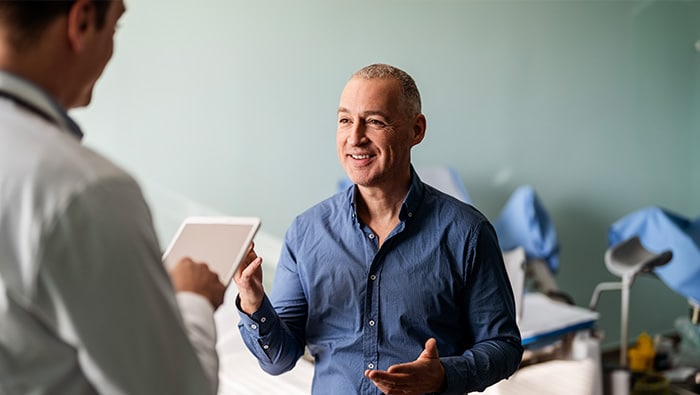Frequent Urination: 5 Treatments and 5 Natural Approaches
On average, people urinate about six or seven times a day. If you routinely go more and aren’t pregnant, taking certain medications, or drinking a lot of fluids, your bladder could be trying to tell you something.
Specifically, you might have a urological condition that leads to frequent urination.
Going to the bathroom more than eight times a day and more than twice at night is considered frequent urination. It can be a sign of several common urological conditions, some temporary and others more persistent.
You should pay close attention to detect whether your frequent urination is persistent, because it can be a symptom of an issue that might worsen. The sooner you can tell, the faster you can get it treated by a urologist, and potentially with some self-care at home.
Understanding Your Urinary System
The reasons you might need to urinate more often can vary, but understanding how the urinary system works helps explain why. It includes several key parts that work together to filter waste and remove it from your body:
Kidneys: Located at your back on either side of your spine, the kidneys filter toxins and extra fluid from your blood, turning them into urine.
Ureters: These two slim tubes carry urine from the kidneys to the bladder.
Bladder: This hollow organ stores urine for two to four hours, holding about two cups on average.
Urethra: The final tube that carries urine out of the body.
Two other structures can also affect how often and comfortably you urinate:
The male prostate. A small gland that makes male reproductive fluid. It sits under the bladder and the urethra runs through its center.
The pelvic floor. A structure of interconnected muscles that supports your lower organs.
Common Conditions That Can Cause Frequent Urination
Each part of the urinary tract can be affected by different conditions that make you need to urinate more often. Here are five of the most common:
Urinary tract infection (UTI) – If bacteria get into your urethra and make it to your bladder, it will develop into an infection with frequent, burning urination. Women are more prone to UTIs than men, due to shorter urethras that are close to the anus (and fecal bacteria).
Overactive bladder – Overactive bladder (OAB) causes the frequent and sudden need to urinate, even if the bladder is not full. Hormonal changes, urinary blockages, bladder irritation, and faulty messaging from the nerves to the bladder can cause it.
Interstitial cystitis (IC) – Often referred to as painful bladder syndrome, IC is a chronic condition that causes frequent urination and is often mistaken for a UTI. Researchers are not certain of its cause, but believe a damaged bladder lining or an autoimmune reaction might contribute.
Weak pelvic muscles – Pregnancy, age, and obesity can stretch and weaken your pelvic floor muscles, so the organs they hold can fall out of place. If the bladder slips, it could bulge into the vagina and push urine out more frequently.
Enlarged prostate – The male prostate begins to grow as men enter their 40s and 50s, and in time the enlarged tissue can constrict the urethra and make passing urine a challenge. The condition is noncancerous, but the backed-up urine can irritate the bladder and trigger contractions.
Treatment Options for Common Causes of Frequent Urination
If you suspect you have any of the above urological issues, it might be time to get it checked with a urologist. Be ready to tell the doctor how often you urinate, the color of your urine, what you drink, and any medications you take.
Your doctor might test your nerve function and bladder strength, or look for abnormalities using a thin, camera-equipped scope inserted through your urethra (cystoscopy).
If you are diagnosed with one of the following conditions, these treatments could be advised:
Treatment options for a UTI. In typical cases, your doctor will prescribe antibiotics to kill the bacteria. For complex infections, the drugs may be administered intravenously (IV).
Treatment options for OAB. Medications can relax the bladder so it can hold more urine or prevent it from squeezing before full (this includes the option of Botox injections). Or you can undergo minimally invasive nerve stimulation, including Axonics neurostimulation therapy, in which small implants modulate the nerves that control your bladder.
Treatment options for interstitial cystitis. Because IC can have several causes, you might be prescribed a combination of medications to reduce pain and urination frequency (this includes IV-delivered drug cocktails). Also ask about biofeedback therapy to learn to relax the bladder, or a procedure in which the bladder is expanded with liquid (under anesthesia).
Treatment options for bladder prolapse. If the bladder slips into the upper vagina, women can self-insert small medical devices called pessaries to hold the bladder in place. Women can also opt for surgery to rebuild the pelvic floor with their own tissue or mesh.
Treatment options for an enlarged prostate. If BPH is mild to moderate, medications can help by calming the urinary muscles or shrinking the prostate. To more permanently reduce prostate size, the tissue can be removed with lasers, electrical currents, or waterjets (Aquablation Therapy). Or, for no cutting at all, a procedure called UroLift pulls tissue off the urethra with tiny implants.
Try These at Home: Natural Remedies for Frequent Urination
You might be able to reduce frequent urination at home by practicing the following healthy habits.
- Cut back on diuretics. Alcoholic or caffeinated drinks can increase urination and irritate the bladder. If you drink a lot of these, replace some with water.
- Try to lose extra weight. Added pounds can pressure the bladder and pelvic muscles. Ask your doctor about a healthy weight for your body type.
- Pick up Kegels. These squeeze-and-release exercises strengthen the pelvic muscles. Pretend you are holding in urine briefly, release, and repeat. Men and women can perform these throughout the day.
- Delayed voiding and double voiding (for OAB). Schedule trips to the bathroom at regular intervals to train your bladder to hold it in. In double voiding, sit and wait a few seconds after going, then go again to ensure your bladder is fully empty.
- Eat more apples, less chips. High consumption of ultra-processed foods might cause OAB, research shows, potentially due to artificial additives, salts, and fats that induce inflammation.
You do not have to live with ongoing urinary symptoms. If frequent urination is disrupting your daily life, consult a doctor. Together, you can choose a treatment plan that works for you.
Want to know more? Visit our medical services page to learn about the conditions we treat and how. To request an appointment, call 509-747-3147.



